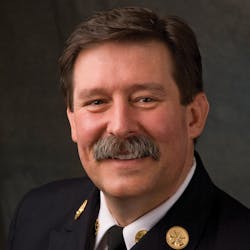
Curt Varone narrows a list of 29 law/codes that affect the fire service to the handful that are most impactful.

The interconnection between the fire service and the law has intrigued me for as long as I can remember. The two are so intertwined that listing all of the laws that have an impact on the fire service is a challenge, let alone identifying those that are the most important.
We can start with a list of all of the laws that impact the fire service (see table). Some are specific laws, such as the Fair Labor Standards Act (FLSA). Others could more rightly be characterized as subject matter areas, such as civil service laws.
After due consideration, here are the five laws that have the biggest impact on the fire service, starting with the most important:
No law has a bigger impact on fire department operations than the FLSA. In career departments, it regulates the hours that firefighters may work before overtime must be paid and comp time, substitutions (shift-trades), early-reliefs and paid details (none of which are permitted in the private sector). In the volunteer service, the FLSA places restrictions on the benefits that personnel can receive and still qualify as volunteers. Without the FLSA, the fire service—career, combination and volunteer—would be vastly different in terms of compensation, staffing, hours and personnel. I will leave it to the reader as to whether that would be better or worse.
Few professions are as dangerous as firefighting, and none of those (commercial fishing, logging and mining) has advanced life support standing by every time that an individual goes to work. Unlike commercial fishing, logging and mining, our EMS systems turn what could be fatal firefighting injuries into survivable events.
The connection between the fire service and the Occupational Safety and Health Administration (OSHA) is a bit strange. Federal OSHA does not have jurisdiction over state and municipal firefighters. States may choose to require compliance with federal OSHA standards. Even then, it is the state, not federal OSHA, that bears responsibility for enforcing the Occupational Safety and Health Act of 1970 requirements for public employees. Nevertheless, OSHA plays an important role in setting minimum health and safety standards for firefighters.
Title VII of the Civil Rights Act of 1964 prohibits discrimination in employment on the basis of race, national origin, gender and religion. It has had a major impact on hiring and promotions within the fire service. Many departments have been under court imposed/approved hiring quotas for decades. In some departments, promotions have been blocked for years as courts wrestle with Title VII cases. Title VII also is the tool of choice for attorneys who represent individual firefighters who are the victims of unlawful discrimination.
It is difficult to imagine an occupation for which physical abilities are more important than firefighting. The enactment of the Americans with Disabilities Act (ADA) in 1990 caused fire departments to reevaluate physical and mental requirements to ensure that they do not unlawfully discriminate against those who have a disability, while simultaneously ensuring that personnel can perform the essential functions of the job. The ability of incumbent firefighters to continue to do the job is fertile ground for ADA lawsuits.
Firefighting is a dangerous profession. There is no shortage of firefighter injuries and, not surprisingly, no shortage of workers’ compensation lawsuits. Common compensation cases involve disputes over whether an injury is job-related and whether the employee is entitled to certain treatments. Fire service cases also involve the interpretation of and challenges to cancer, heart, lung and infectious disease presumption laws. Recent concerns over the coronavirus raise questions about whether workers’ compensation will cover the costs that are associated with COVID-19 quarantine.
Curt Varone will present “Social Media Challenges in the Fire Service” at Firehouse Expo. To register, visit firehouseexpo.com.